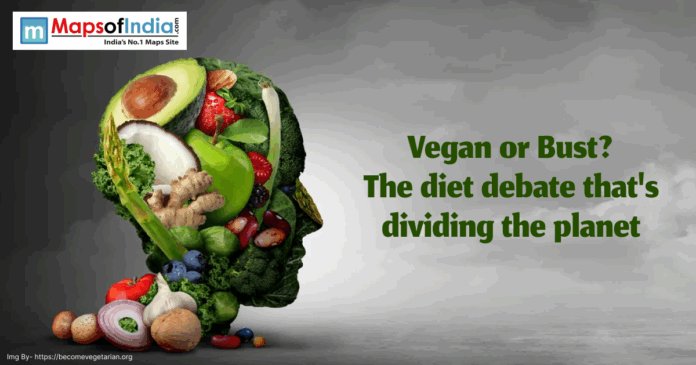As of late, debates about what to eat have become more intense and veganism has become a major area of focus. Some claim vegan diets will help with health problems and lower the stress on the environment, but others doubt whether these diets offer proper nutrition. It studies the various arguments that are brought up about veganism and looks at their impact on health, the environment, ethics and social systems.
The Rise of Veganism: A Global Shift
Veganism used to be a small trend but has now grown worldwide. Thinking about animals, the environment and their own health, individuals nowadays are embracing plant-based dining more than before. Because more people want plant-based foods, we are seeing them introduced in both supermarkets and restaurants.
Health Implications: Benefits and Challenges
Benefits:
A carefully put together vegan diet can help you enjoy many health benefits:
- Cardiovascular Health: A plant-based diet often reduces the amount of saturated fat and cholesterol which is good for your heart.
- Weight Management: Vegans are more likely to have a lower body mass index (BMI) than typical omnivores.
- Chronic Disease Prevention: A diet including more fruits, vegetables and whole grains may help prevent type 2 diabetes, various cancers and hypertension.
Challenges:
Yet, if not handled correctly, vegan diets might cause a nutritional imbalance.
- Nutrient Deficiencies: A few health risks are caused by vitamin B12, iron, calcium, omega-3 fatty acid and protein deficiencies.
- Digestive Issues: Having a lot of legumes and whole grains in your diet might upset your digestive system in some cases.
- Accessibility: For people living in places where diverse plant foods are scarce, it can be hard to balance their vegan diet.
Environmental Considerations: Sustainability and Resource Use
Positive Impacts:
A vegan diet is very good for the environment and helps you lower your environmental impact.
- Greenhouse Gas Emissions: Animal farming causes about 14.5% of all global emissions of greenhouse gases. Diets based on plants can lessen the effects on the environment.
- Water and Land Use: Less water and land are needed to cultivate plant-based meals than to raise animals for food. A kilogram of beef uses almost 15,000 liters of water, unlike vegetables which use much less.
- Biodiversity Preservation: When less animal products are used, it reduces the pressure on nature, supporting efforts to save wildlife habitats.
Considerations:
Since veganism can help the environment, some aspects need careful consideration:
- Agricultural Practices: Based on the methods and products used in farming, the environment can be affected in different ways by plant-based foods.
- Processed Alternatives: Some Processed Meats are made with processed ingredients and may not help the environment as much as whole foods.
Ethical Dimensions: Animal Welfare and Moral Considerations
Those who argue for veganism point to the rights and well-being of animals.
- Animal Rights: Veganism is against animals being harmed for food, clothed or in any other way and it supports the importance of all creatures with feelings.
- Factory Farming Concerns: Industrial animal agriculture often involves practices that raise significant ethical concerns, including confinement and inhumane treatment.
Societal and Economic Impacts
Being vegan affects more than just food choices:
- Economic Considerations: Moving away from raising animals might negatively impact places where livestock farming helps the economy, so support for impacted areas may be needed.
- Cultural Practices: Taking on veganism is more challenging for some due to their culture, so the approach should consider people’s cultural traditions.
Personal Choice and Flexibility
Even though many people see benefits in becoming vegan, we should also remember that personal eating habits are shaped by individuals’ cultures, health requirements and financial situation. Not everyone can or chooses to adopt a totally vegan lifestyle. A good alternative is to eat less meat, try going without meat on Mondays or make sure the animal products you use are ethically produced and from the local area. Having open, respectful talks about food can help individuals decide what’s best for them and their lives.
The Role of Technology and Innovation
Improvements in food technology are changing how people see veganism. Plant-based meats, cultured meat and dairy-free products are now higher quality and easier to get, allowing consumers to cut down on animal products with little loss of flavor or nutrients. Such changes can assist people who want to eat more vegan or plant-based meat by giving them tastes and textures they’re used to, lessening the environmental and ethical problems connected to normal animal meat. Still, there are doubts about whether these products are sustainable and affordable, plus their effects on health which shows that we should keep researching and label products plainly to assist informed decision-making.
Social Dynamics and Community
What we eat is usually affected by the people around us and the values that are common in our area. Sharing food, whether for a meal or at a celebration, usually helps people connect and feel like they belong. Switching to a vegan diet can make some people feel isolated or cause tension, mainly for those who live where meat is very important. Many people feel united and empowered when part of a vegan community, where they share advice, ideas and efforts to help animals. Being aware of these social aspects makes it possible to have more open talks on diet, health and sustainability which builds understanding, not division.
Conclusion: Navigating the Dietary Debate
Veganism is discussed because it involves many aspects like health, the environment, ethics and society. Even though a properly arranged vegan diet can be rewarding, it can also bring along difficulties that need careful thought. Making healthy and sustainable decisions about nutrition should be personalized for every person’s situation and requirements.




